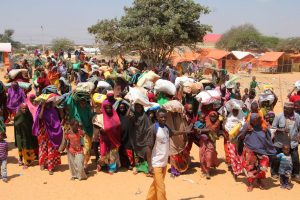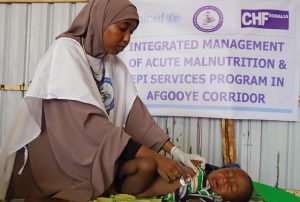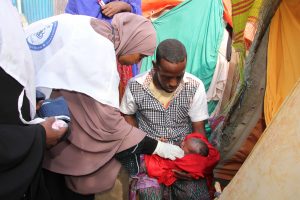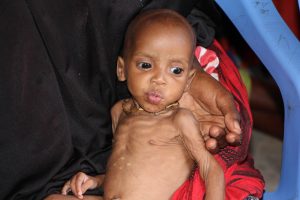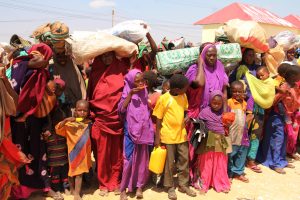
The ongoing drought has forced many people to leave their homes in search of alternative sources of food and water. According to UNHCR, over 444,000 people have been newly displaced between November 2016 and February 2017, as a result of the ongoing drought. The majority of new displacements are in Bakol, Bay and Lower Shabelle Internally displaced persons (IDPs) have been observed moving to current IDP settlements as well as setting up new settlements in town centers.
The conditions in the settlement, which are mainly makeshifts, are difficult; Shelter is needed urgently, especially before the rains come. These IDPs are also vulnerable to rape and sexual based violence as they are living in open areas without protection.
A steady flow of displaced people from Bakol, Bay and Lower Shabelle regions has continued to reach in Afgooye corridor settlement particularly from Km13 to Km17. SOYDA daily observes and met 20 to 30 HH of new arrivals, which include unaccompanied children, and sick and elderly people, most of the new arrivals are hosted by other displaced communities which are already affected by drought. People are leaving their homes because of drought, rising food prices, dry-weather forecasts and ongoing insecurity, and they are heading for urban areas.
SOYDA carried out Integrated Health, Nutrition and WASH mobile and outreach service from K13 to Km17 in order to response the urgent humanitarian needs that caused by Droughts, with the support from UNICEF, CHF, Nutrition and Health Cluster.
Findings and Achievement of the outreach service
- Field achievement of SOYDA for the outreach Service;
- Since from 20th March 2017, for the outreach work SOYDA have attended 1679 number of beneficiaries in the camps visited, 575 are under five children. Most of the children seen were suffering skin diseases, Respiratory Tract Infection, Diarrhea and Intestinal parasites.
- SOYDA observed the high prevalence of non-communicable diseases particularly young ages like hypertensions (high blood pressure) and diabetics, which was mainly related to severe psychosocial stress.
- Both Moderate and Severe Malnutrition was very high, in ONE day a lone, SOYDA admitted 23 severe malnutrition children cases in Ale Amin Cap located Km13 (GPS: N.02.06931, E:045.24117) with 3 hours mass screening, this camp is one of the camps that hosts new arrivals on daily bases, shelter was one of the main challenging to the new arrivals. The total admitted during the course of the outreach is 159 severe malnutrition children.
- SOYDA Provided psychological and trauma counseling some of the old people and particularly mothers who come to the camp for seeking assistance and left behind her husbands and childrenand have some worries on the safety of their loved once. Also we did Antenatal and post-natal care counseling service during the outreach consultations.
- IYCF and NHHP were among key mobilizations that SOYDA carried out during the outreach camps.
Humanitarian needs
Mogadishu corridor IDPs is a highly complex humanitarian environment. The prolonged conflict destroyed most of the basic social services infrastructure and it needs international support to renovate and restore necessary services. The IDP settlements are scattered across the outside city and the limited space in the settlements poses a huge challenge to the delivery of services.
Health: In the camps there is insufficient shelter, overcrowding, bad hygiene conditions, and a limited access to basic services/amenities such as health, clean water, latrines, and health education activities. This resulted in increased cases of communicable diseases such as upper and lower respiratory tract infections, skin infections, outbreaks of acute watery diarrhea (AWD), and confirmed cholera and measles cases. Immediate mass vaccination campaigns, clean water, hygiene promotion activities and the strengthening of camp-wide health service delivery were necessary, especially in the large camps. We noted that new arrivals of IDPs living in the area were not aware where they could seek medical and nutrition attention and indeed they were suffering luck of communication and information on proper places for referral
Nutrition: the IDP nutrition situation remains vulnerable due to a dependence on humanitarian assistance, income from petty trade and casual labor opportunities that are closely linked with rural and urban livelihoods. Sustainable nutrition interventions are required to reduce malnutrition, particularly integrated package nutrition service including community mobilization, supplementary feeding programmes (SFP), outpatient therapeutic feeding programmes (OTP) and strengthened coordination with maternal and child health centres (MCHs) and WASH is very much crucial.
Shelter and NFIs: Shelter and non-food items (NFIs) remain also most important need among IDPs. Makeshift shelters are congested and in very poor condition, with a significant number situated in low-lying areas exposed during the Gu rains. Urgent provision of shelter and NFI to particularly Ale Amin Cap located Km13 (GPS: N.02.06931, E:045.24117) that hosts most of the newly arrived IDPs is crucial
Protection: In general insecurity situation in Mogadishu IDPs remains a crucial protection concern. IDPs are endangered, access to livelihoods is limited, and IDPs are exposed to countless violations including but not limited to, gender-based violence (GBV), rape and all forms of discriminations. Immediate establishment of stop GBV centers as well as family centers is highly recommended from Km13 to Km17, also Advocating with other cluster members regarding having lockable gender segregated latrines for safety and privacy. As IDP influx increasing, responding to the protection issues of the newly displaced population will require special attention.
WASH: IDP settlements often overwhelmed by uncollected garbage. Vulnerable people are at risk of a cholera outbreak during the rainy season. Sanitation continues to be a concern and a priority at the IDP settlements. Immediate intervention is water trucking, water voucher, and distribution of hygiene kits and construction of latrines as well as lockable gender segregated latrines for safety and privacy.
CONCLUSION AND RECOMMENDATION
Somalia needs Urgent action is required now – if not we risk a rapid and deep deterioration of the situation. Communities are losing their means of survival and we need to stop this loss of lives and forced displacement, as people have no other option but to move in search of food, water and income. An estimated 1.7 million people are in need of some type of humanitarian assistance and livelihood support including health, nutrition, Water and Food; we request the urgent support in this matter. The time to support and fund is NOW to come back from the tipping point and to avoid a greater crisis. We can save lives now, offset losses from the severe drought, build resilience and lift people out of crisis.
The situation that witnessed on ground was glaring gaps related to basic essential lives, however the most urgent is provision of water and basic livelihood relief to avoid possibility of diseases and death. There is need for organizations to swing to action and provide both short and long term intervention.

